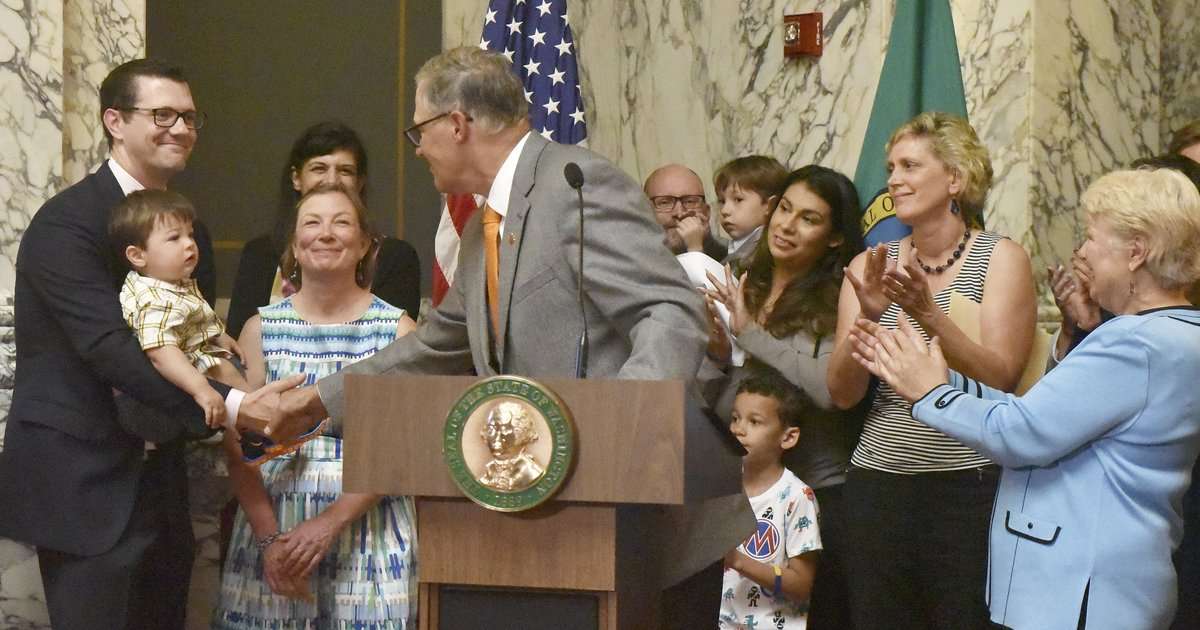The measure offers eligible workers 12 weeks paid time off for the birth or adoption of a child, or for the serious medical condition of the worker or the worker’s family member, beginning in 2020.
OLYMPIA — Washington state is now among a handful of states that guarantee paid family leave, after Gov. Jay Inslee’s signing Wednesday of a bipartisan plan approved by the Legislature.
The measure offers eligible workers 12 weeks paid time off for the birth or adoption of a child or for the serious medical condition of the worker or the worker’s family member beginning in 2020, or 16 weeks for a combination of both. An additional two weeks may be used if there is a serious health condition with a pregnancy.
Washington joins four other states with paid family-leave programs: California, New Jersey, Rhode Island and New York, though New York’s program doesn’t take effect until next year. The District of Columbia earlier this year also approved a paid family leave law, though it doesn’t take effect until July 2020.
The plan in Washington state — passed by the Legislature on Friday — comes after months of negotiations between lawmakers and those in the business and labor communities, and it closes the loop on work left unfinished by the 2007 Legislature.
That year, lawmakers created a paid family-leave program that required many employers to offer five weeks of paid time off for new parents. But they never came up with a way to pay for the benefit, resulting in an indefinite delay of its implementation.
This year the business community was part of the discussion on legislative action, in part, because of recent successes by labor groups at the ballot box in Washington state, like the recent initiative to increase the minimum wage and sick leave that was approved by voters last November.
Under the new law, both employers and employees pay into the system, and weekly benefits are calculated based on a percentage of the employee’s wages and the state’s weekly average wage — which is now $1,082 — though the weekly amount paid out would be capped at $1,000 a week. Workers who earn less than the state average would get 90 percent of their income. Employees must work at least 820 hours before qualifying for the benefit.
Self-employed individuals who elect coverage pay only the employee share of the premiums, and employers with 50 or fewer employees are exempt from paying the employer share. Companies that already offer such programs can opt out, as long as they are at least equivalent to the state program.
Premiums of 0.4 percent of wages would start being collected on Jan. 1, 2019, with 63 percent paid by employees and 37 percent paid by the employers.
According to a Senate calculator, an employee who makes $50,000 a year would pay $2.42 a week, while their employer would pay $1.42 a week, for a weekly benefit of about $703.
Sara Reilly, who co-owns Three Magnets Brewing Company and Darby’s Cafe in Olympia, spoke at a rally on the Capitol steps before the signing, and said that she and her husband have wanted to offer paid and family medical leave for their employees, but previously were unable to cover the costs alone.
“This is an extremely inexpensive way to give our employees a benefit when they so desperately need it,” she said.

dumbledorito on September 5th, 2017 at 05:58 UTC »
The other states are California, New Jersey, New York, and Rhode Island.
gimpwiz on September 5th, 2017 at 05:00 UTC »
To those saying "only 12 weeks," please remember that 12 > 0.
In fact, I might even say that 12 >> 0.
esengo on September 5th, 2017 at 04:05 UTC »
my second child was born on a Wednesday. I was back working the following Monday. Three months would have been perfect, especially for our mental well being.